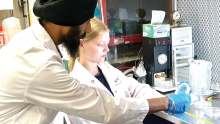In our busy everyday lives, it's easy to overlook our deep-rooted connection with nature. The connection is not just about the nourishment we derive or the air we breathe; nature subtly but significantly enhances our well-being. This intriguing intersection is where McGill Department of Natural Resource Sciences PhD candidate Jackie Hamilton directs her research.


Dr. Murray Humphries (PhD’01), a passionate wildlife biology professor at the Macdonald Campus, spends his days immersed in the fascinating world of biodiversity—the colorful, complex tapestry of life on Earth. At the Macdonald Campus, we don't just study this diversity, we celebrate it.

The tidal wetlands and dykelands of the inner Bay of Fundy are critical ecosystems in Nova Scotia and New Brunswick, providing essential benefits to human and non-human communities.
These ecosystems offer biodiverse habitats, protection from coastal flooding, and cultural value for Indigenous, Acadian, and other communities. However, they are increasingly threatened by climate change, making their management more complex and their future uncertain.

The spike in farmland prices has boosted the equity of farmers all across Canada. Are farmers leveraging this new-found equity to generate new business opportunities or farm wealth? To explore what farmland values mean for farms and farming across Canada, Country Guide sat down with Pascal Thériault, agricultural economist at Macdonald Campus, McGill University and vice-president of Quebec’s Ordre des agronomes.

The Canadian Food Inspection Agency recently approved gene editing for use in breeding new crop varieties, meaning plant breeders can now apply the technology to their work. Gene editing has the potential to quickly develop new varieties with greater accuracy in targeting traits such as drought and disease resistance, with promising agronomic and trade implications for farmers.

McGill team funded as part of a $4.5 million national investment dedicated to identifying genomic solutions to counter antimicrobial resistance and prepare for future pandemics

The Prix Acfas Léo-Pariseau was awarded to Alain Brunet, full professor in the Department of Psychiatry. "La Preuve par l'Image" Jury Prize, sponsored by NSERC, was awarded to Anja Geitmann, Dean of the Faculty of Agricultural and Environmental Sciences.
In the not-so-far-off future, artificial intelligence could help farmers analyze data to make decisions and improve their outputs.
“The bottleneck right now is that farmers have data but don’t necessarily know what it means. They often need a specialist to figure it out,” says Felippe Karp, a PhD candidate in McGill's Bioresource Engineering department and member of the Precision Agriculture and Sensor Systems (PASS) research team led by Professor Viacheslav Adamchuk.

An outbreak of extensively drug-resistant salmonella has been linked to raw pet food and contact with cattle, according to the Public Health Agency of Canada.

We live in the Anthropocene era. Human actions have become the major driving force behind unprecedented environmental challenges, creating delicate complexities and uncertainties about the future of the planet and humanity. Canada’s critical landscapes are not spared from these challenges, threatening the well-being of human and non-human communities that depend on them for various natural benefits. Thus, our ability to prepare, plan, and reflect for the future has never been as important to ensure that Canada’s landscapes thrive sustainably and resiliently in the Anthropocene.

Annual list includes 16 researchers among the world’s most cited, Canada retains 6th place overall in global ranking
In answer to a question posed by a reader, La Presse looked into the origins of the Metro group with expert commentary from agricultural economist Pascal Thériault, Director of McGill's Farm Management and Technology program and Senior Faculty Lecturer.
Among the five major players in the grocery field (Metro, IGA, Loblaw, Costco and Walmart), Metro is the only one to have its head office in Quebec. The big decisions are therefore made here, indicated Thériault.
After "shrinkflation," it's now de-qualification drawing criticism from consumers concerned about marketing ploys that give the impression of getting less for their money. The Trudeau government promises to investigate the practice, but experts say immediate action is needed.
In most cases, ingredient substitutions are virtually imperceptible. But recipe changes for certain foods can leave their mark.
 Agriculture in the Classroom Canada (AITC-C) has named Mathieu Rouleau as their new executive director.
Agriculture in the Classroom Canada (AITC-C) has named Mathieu Rouleau as their new executive director.
Based in Quebec, Rouleau grew up on a dairy, grain, and maple syrup farm and holds a Bachelor in Agricultural Economics, Agricultural Business and Agronomy from McGill University.

Millet, once a staple in Indian cooking and agriculture before being superseded by rice, is at the centre of a massive promotional campaign launched by the Indian government.
The healthy and hardy cereal, which thrives in arid and difficult conditions in which other crops cannot survive and requires less water, is being touted as a "superfood" that could force a more nutritious diet on India's population, and also help mitigate the devastating effects of climate change on the South Asian country.
